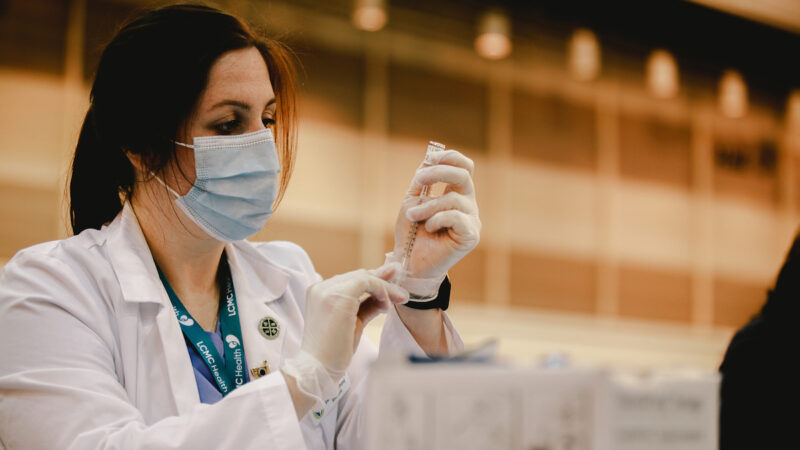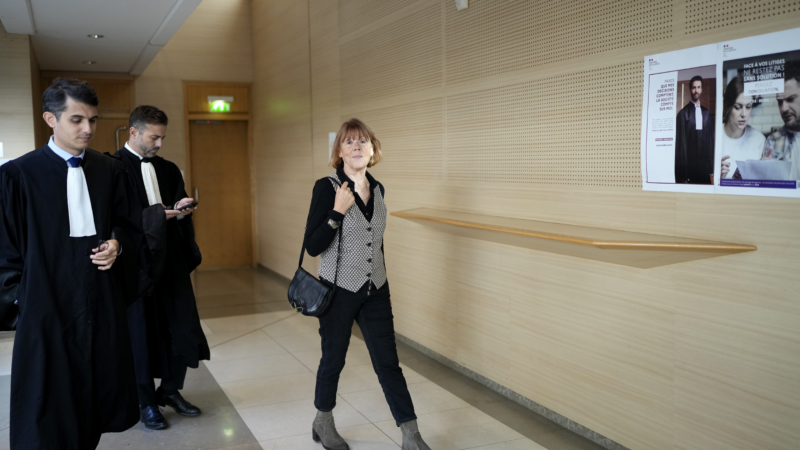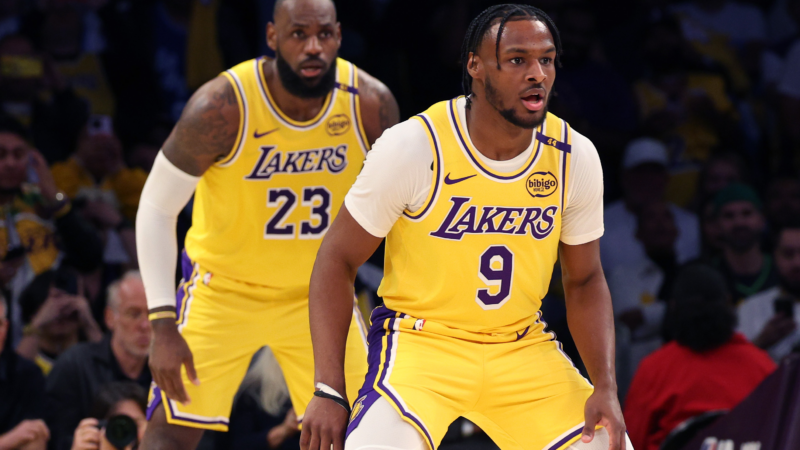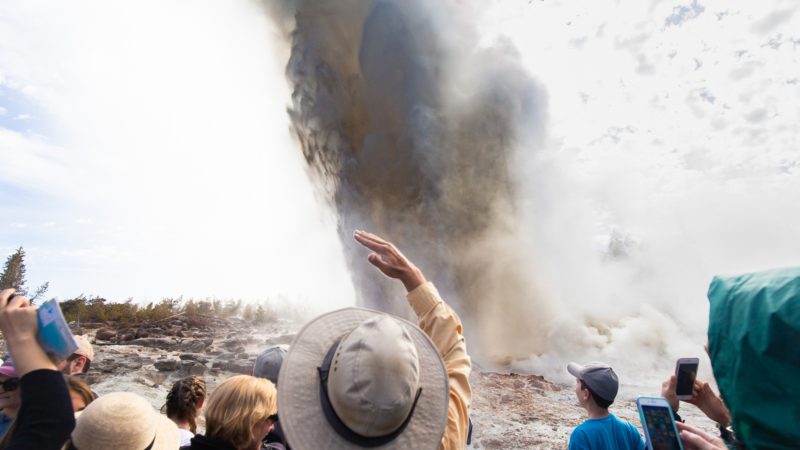Amid Delta Variant Surge, Some Call For Vaccine And Mask Mandates
A vaccinator administers a dose of a COVID-19 vaccine at the Ernest N. Morial Convention Center in New Orleans.
Updated Aug. 3: The governor of Louisiana instituted a public mask mandate on Monday, Aug. 2, 2021.
The delta variant surge in Louisiana, Mississippi and Alabama is putting a strain on hospital systems and creating a crisis that’s akin to when the COVID-19 pandemic first took hold. Meanwhile, the region continues to have some of the lowest uptake of the COVID-19 vaccine.
While states have tried coaxing reluctant residents into getting the shot with various incentives, some businesses and health experts in the region say it’s time to start creating more disincentives for the unvaccinated. During a press conference on Friday, Louisiana Governor John Bel Edwards even hinted at another statewide mask mandate.
“I can tell you that I have received over the last 24 hours or so numerous requests from hospitals and healthcare organizations and other entities to reinstate a statewide mask mandate,” Edwards said. “This is something that I am seriously considering.”
While Gulf States are now seeing a slight increase in vaccine uptake, they are still lagging behind most of the country and facing the impact of a delta variant surge among the unvaccinated, including children. It was announced last week that at least one child died of COVID-19 in both Mississippi and Louisiana.
“Nobody really knows how to model delta appropriately,” said Joseph Kanter, Louisiana state public health officer, in a recent press call. “So it’s difficult to predict how high we’re going to get and how long we’re going to be in this. It’s not a comforting place to be at any point.”
“It’s as bad now in Louisiana as it has ever been at any point in this pandemic. And I say that still with some degree of shock that we are back here,” said Kanter.
As Mississippi state epidemiologist Paul Byers said in a press conference last week, normal day-to-day activities — like going back to school — are now risky.
“We need to have an expectation that we are going to see cases in the school setting. We will see cases among students and we will see cases among teachers,” Byers said.
No More Time For Carrots, Pull Out The Sticks
States like Louisiana have tried a carrots approach by incentivizing vaccines through lotteries and free fish fry dinners. But now, some business and health experts say it’s time to pull out the sticks.
At The Howlin’ Wolf, an entertainment venue in New Orleans, owner Howie Kaplan has taken lots of steps to mitigate COVID-19 spread. He can point to a handful of fans and air conditioning units that blast air through open doors. In addition to ventilation, he’s now asking anyone who comes through the building to mask up.
“The better step for us to take is to ask our guests to put their masks back on in the interest of safety, if not for themselves but for everyone else,” Kaplan said.
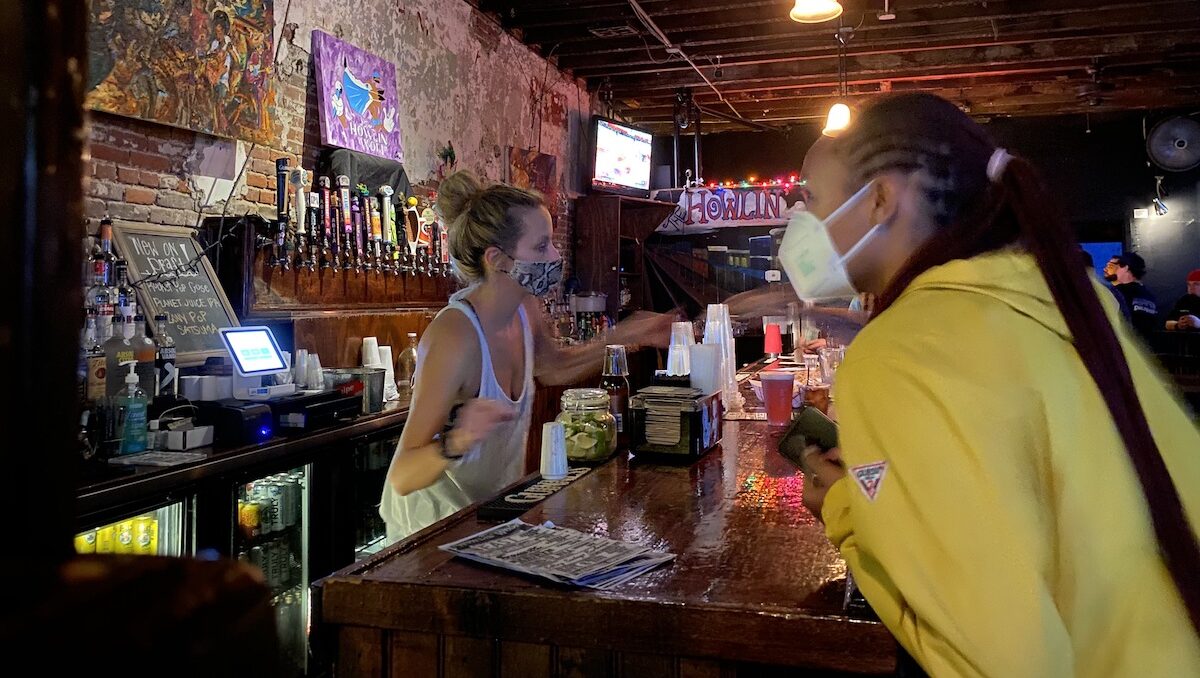
Shalina Chatlani,Gulf States Newsroom
Bartenders and patrons at Howlin’ Wolf in New Orleans are required to wear masks in July 2021.
Most states in the region are hesitant to mandate universal masking, but Kaplan knows he has the power to enforce a mandate as a business owner. He thinks it’s the right thing to do in order to stop the spread.
“We need to stop it,” Kaplain said. “It’s a shame that this is a public health issue. We ask people to make sacrifices on a fairly regular basis for their neighbors and for their country.”
Louisiana doesn’t require masks yet, but the Centers for Disease Control and Prevention and health officials across the South have highly encouraged them.
Some venues in New Orleans are encouraging face coverings and also asking customers for vaccination cards or negative COVID-19 test results.
Many other settings are adjusting their policies. The University of Alabama at Birmingham has also re-instituted a masking rule. As of early July, the University of Mississippi Medical Center requires employees and students to be fully vaccinated or wear an N95 mask at all times within the facility.
Still, many places aren’t implementing masking rules. Many K-12 schools in the region are planning to reopen without universal masking rules. One seafood restaurant owner in the Mississippi Delta said he doesn’t believe in COVID-19 at all.
Mandates May Become Inevitable
In terms of finding a more permanent solution, Thomas LaVeist, a sociologist and dean of the school of public health at Tulane University, says masking requirements can’t be the only tool of persuasion.
“If you choose not to be vaccinated, you have to get tested. In some cases, you can’t get an education if you don’t get vaccinated. There are concert venues, you know, thinking about not allowing people to come to concerts,” LaVeist said.
As of July 30, Tulane University is one of four private institutions in Louisiana that has instituted a vaccine mandate for its students.
The Biden administration laid out new rules that federal employees must confirm they are vaccinated or get regularly tested weekly for the virus.
LaVeist says it’s time to bring out policies like that at the state level and crackdown on the spread of disinformation.
“The First Amendment doesn’t give you the right to yell fire in a crowded movie theater. I think the same principle applies here,” LaVeist said. “We have not done a good enough job of aggressively going after the people that are creating the disinformation.”
And while it’s politically contentious, Laveist says he also thinks vaccine mandates will eventually have to be implemented in order for the country to emerge into a normal way of life.
Though, he said, it’s clear that given the current pace of vaccinations in the country that the virus is here to stay.
“I think we’re looking at life with the way that we live life with influenza and other conditions. So once we learn more about how long immunity will last with current vaccines, we may have to get boosters on a regular basis,” LaVeist said.
“But, I’m encouraged that we’re going to get back to some level of normality in the coming months, certainly by early next year.”
Editor’s Note: A previous version of this story incorrectly stated that Tulane’s vaccine mandate applied to students and university staff. All Tulane employees are strongly encouraged, but not required, to get vaccinated against COVID-19.
This story was produced by the Gulf States Newsroom, a collaboration between Mississippi Public Broadcasting, WBHM in Birmingham, WWNO in New Orleans and NPR.
Mass trial shines a light on rape culture in France
A harrowing and unprecedented trial in France is exposing how pornography, chatrooms and men’s disdain for or hazy understanding of consent is fueling rape culture.
What’s your favorite thing about fall?
With cooler mornings and shorter days, if feels like fall is finally here. So what’s your favorite thing about fall? We put that question to people at our recent News and Brews community pop-up in Cullman.
Teammates LeBron and Bronny James make history as the NBA’s first father-son duo
The Jameses, who both play for the L.A. Lakers, shared the court for several minutes on the NBA's opening night. They join a very small club of father-son teammates in American professional sports.
After John le Carré’s death, his son had the ‘daunting’ task to revive George Smiley
Nick Harkaway grew up hearing his dad read drafts of his George Smiley novels. He picks up le Carré's beloved spymaster character in the new novel, Karla's Choice.
When Steamboat goes WHOOSH, scientists look for answers
What triggers geysers to go off is still not well understood. A new paper shows that one small earthquake likely triggered an eruption of the world's tallest active geyser, Steamboat.
Trump’s ex-chief of staff warns his former boss would rule like a ‘fascist’
John Kelly is one of several Trump-era White House officials to publicly criticize their former boss, arguing that Trump is not fit to hold office again.
